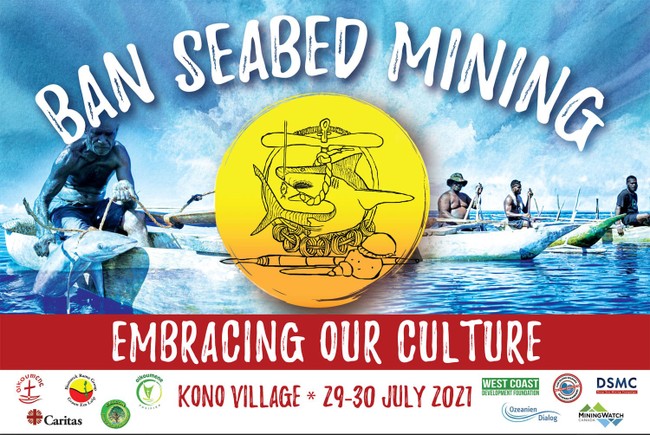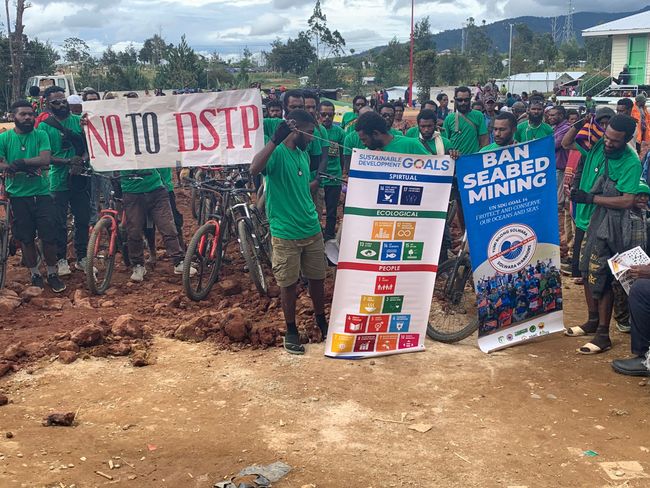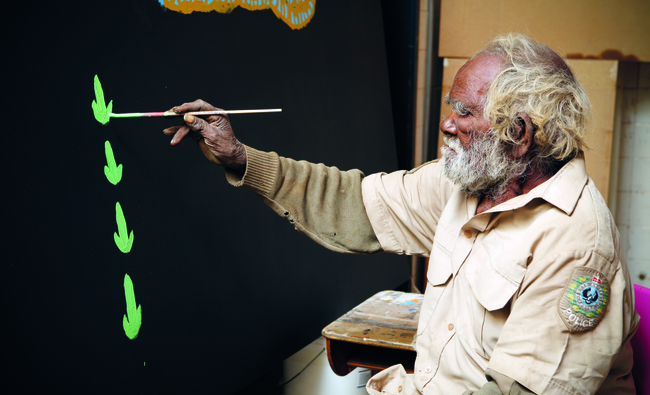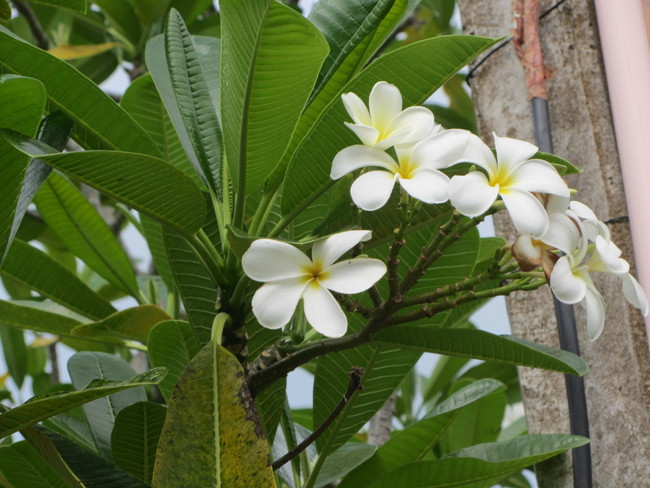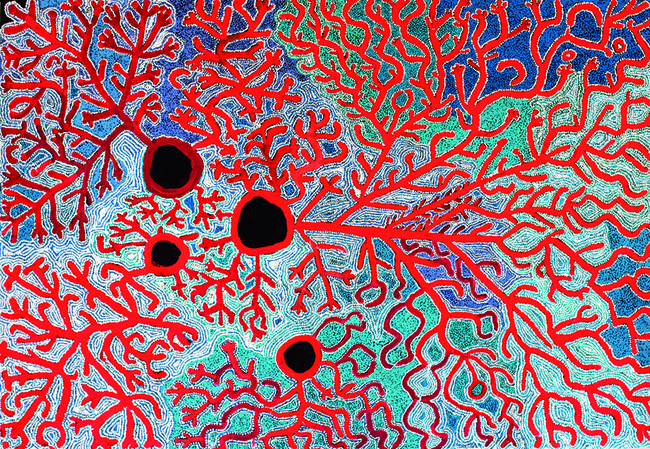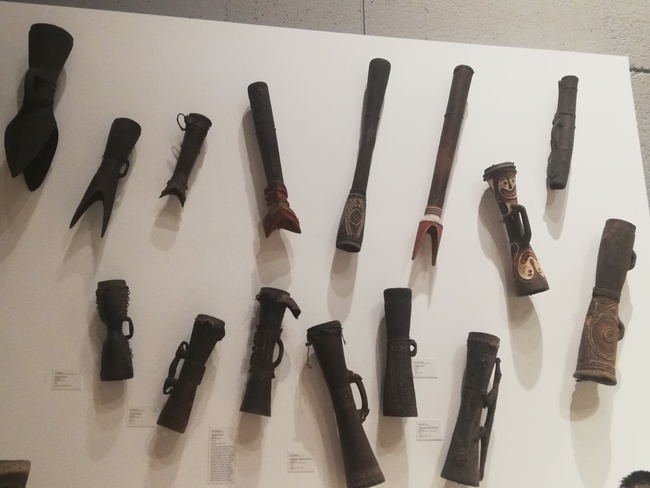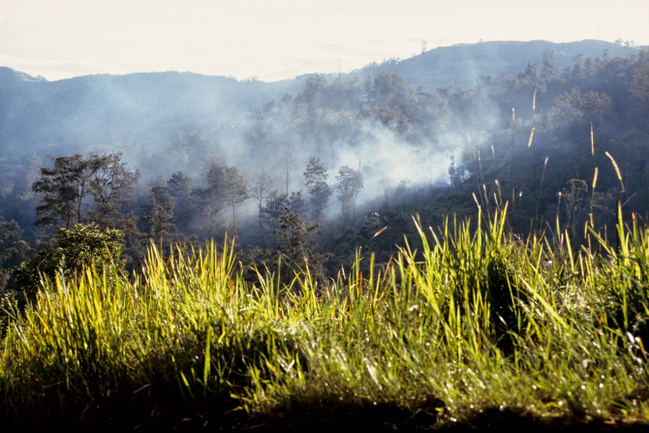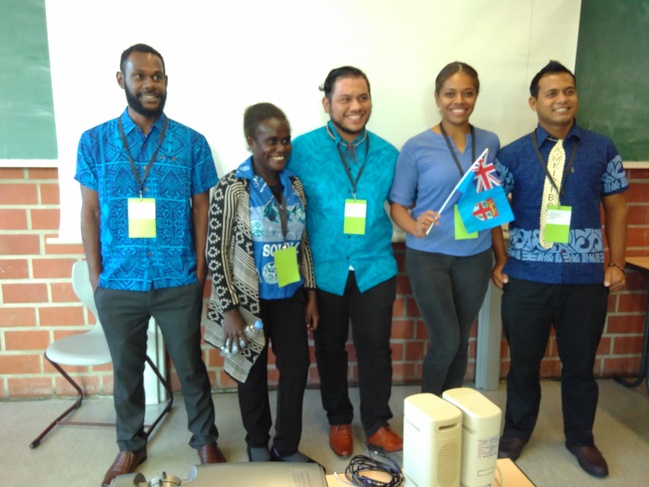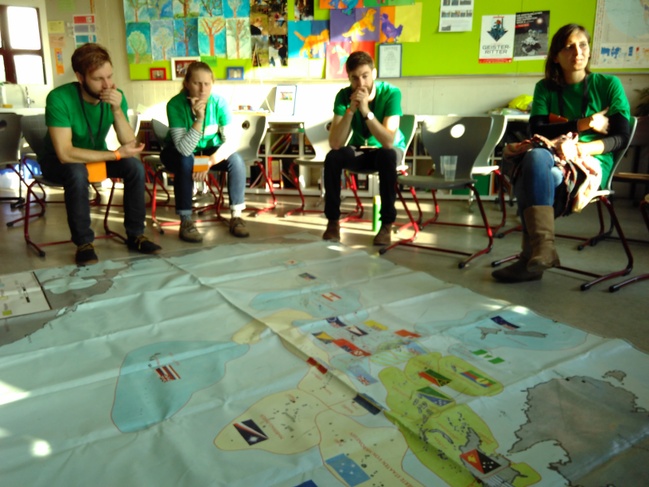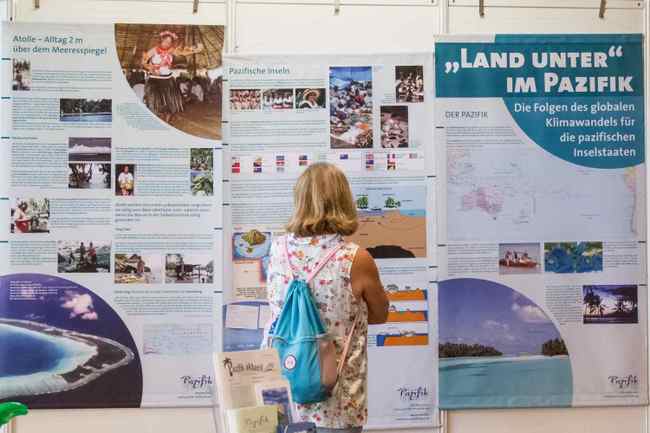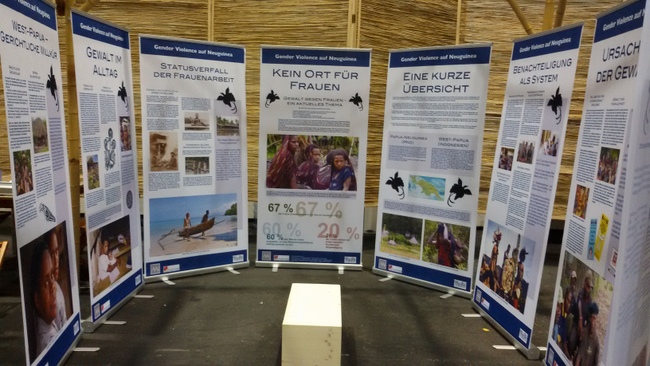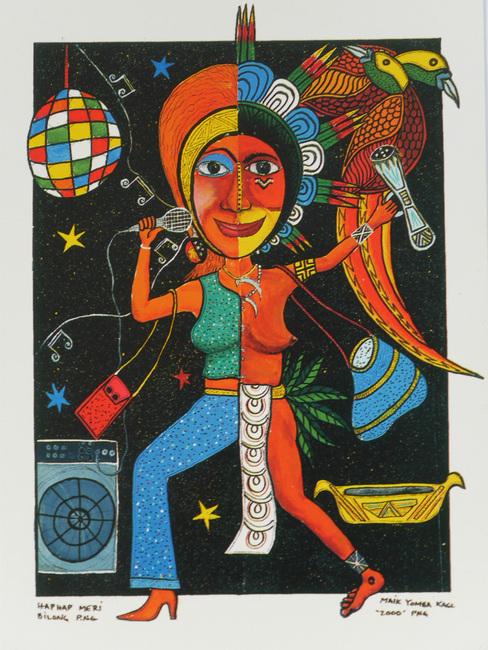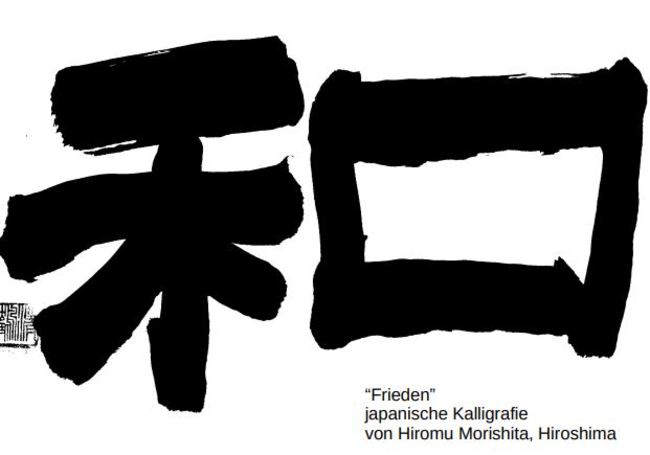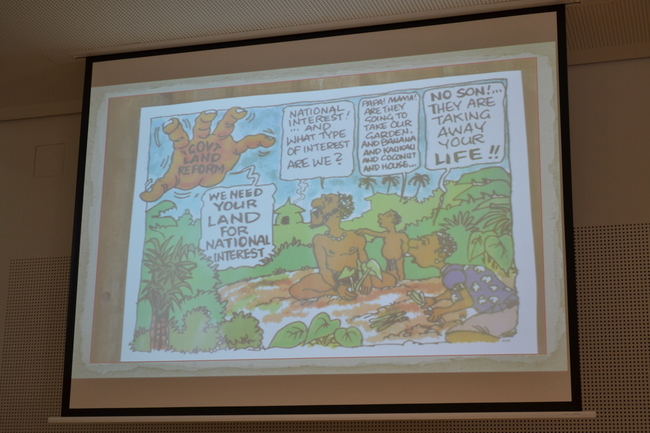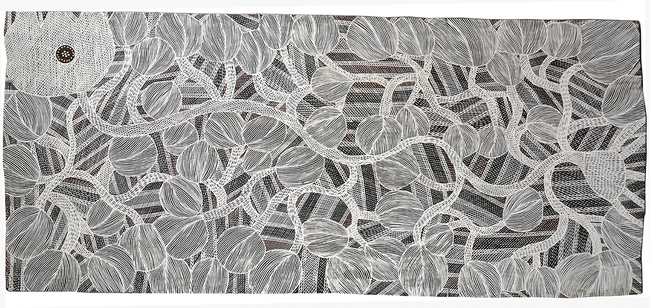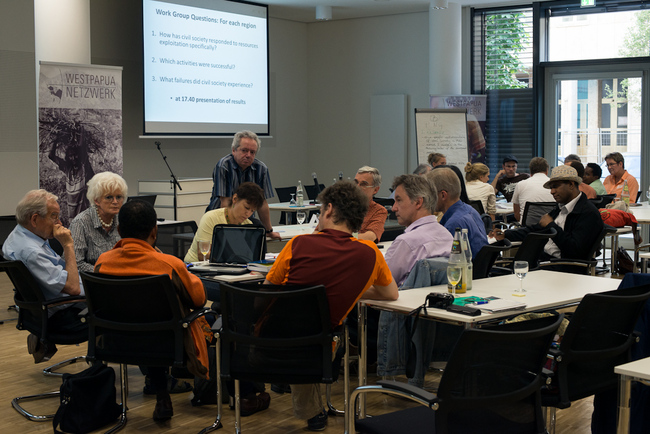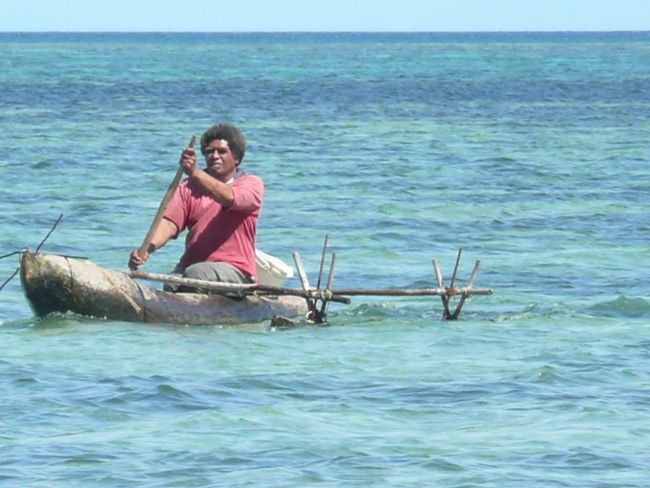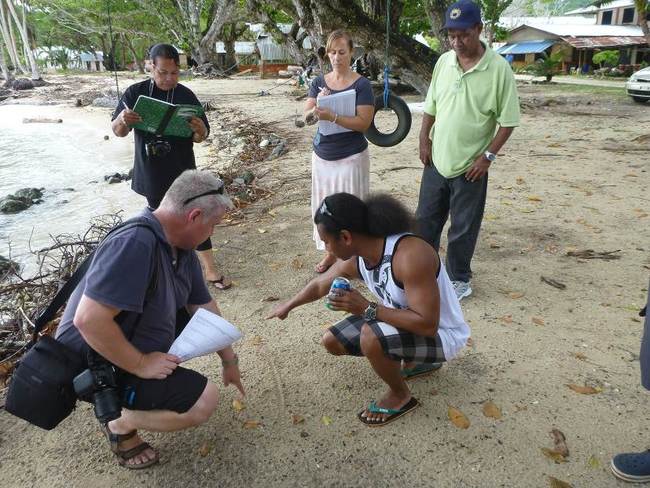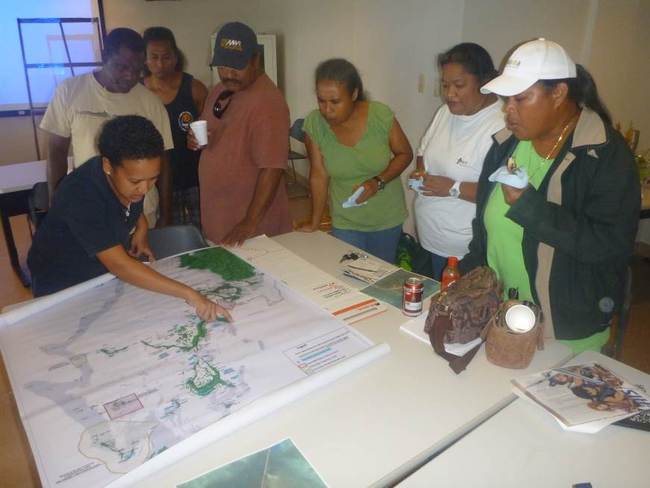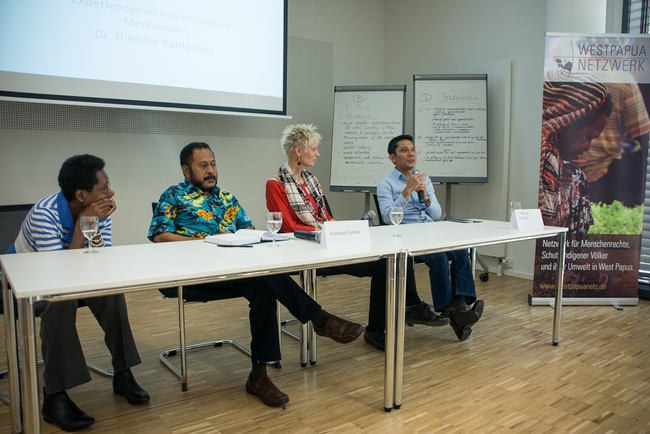Frieden im Pazifik?
13.06.2008: Statement der Pazifik-Fachtagung von April 2008
Peace in the Pacific- Affirmations on peaceful developments in Melanesia
1. A special Seminar
From April 17th to 20th, 2008 about 70 representatives from churches, development- and mission-agencies as well as anthropologists and other friends of the Pacific convened at Centre Mission OneWorld in Germany for this Seminar with the heading "Peace in the Pacific!?;” the focus was on Melanesia. Experts from the Pacific as resource persons gave their addresses: Dr. Steven Ratuva, USP Suva for Fiji; Sr. Loraine Garasu, Bougainville for her Island; Dr. Sinclair Dinnen, ANU Canberra for the Solomon Islands; Dr. Uwe Hummel, Coordinator of the West Papua Network as well as Rev. Hansulrich Gerber from the WCC Geneva, desk charged with the ‘decade of overcoming violence’ - programme. We came together as friends of the Pacific and Christians with concern for this pacific region, as representatives of organisations and networks, in a spirit of open encounter, learning and sharing, with our emphasis for advocacy towards peaceful developments in Melanesia. The papers, workshops, discussions and deliberations were based on essentials like respect for cultural values, ethnic integrity, the impact of Christian principles and promotion of regional suitable solutions.
2. Components for Peace
- Conflicts and violence as well as the quest for peace are embedded in human history and behavioural patterns all across the globe. - Peace, its achievement and its preservation, has many dimensions: environmental, spiritual, politically, culturally, religious. People in primal cultures and religions do determine peace according to traditional value systems within their social orders. The concept of land as well as cosmic order is vital in Melanesian societies. - To maintain a balance between opposing forces and to safeguard future cycles of life throughout the generations is a chief presumption in the social organisation of prime cultures in Melanesia. - Conflicts due to the encounter of ethnic groups within this Melanesian region are complex issues. Conflicts are parts of life; violence as experienced or as forces applied are different realities. Peace was always embattled. - Following the clash of cultures in the encounter of foreign systems and new techniques employed, people had to manage transitions. This brought about the quest to adapt for changes in order to prevent destabilisation. In Melanesia peace seemed to be guaranteed by colonial powers. Tribal societies gradually were framed into new political systems of state and nationhood with impact on social organization. - To enhance, sustain and promote life in its environmental, social and economic as well as cultural settings requires to identify developments which do endanger peace and to constantly search for options for overcoming violence. Origins, components and solutions towards peace require a dialogue between all executive powers of a state with its ethnic realities in the non-central settings. - Peace and Education are very much linked with each other from early childhood on - e.g. children soldiers and the like.
3. The four Regions between violence and consolidation: Workshop Results
A. Bougainville
We do express our admiration for the people of Bougainville to have achieved a climate of reconciliation and dialog after 10 years of war.
The women’s contribution to peace and peace building is highly valued and is considered an encouraging example for other regions of Melanesia.
We support the ongoing peace process and would like to see women represented in politics and responsible positions all over PNG. Violence against women should be strongly opposed by authorities. Gender sensitive education must be stressed more.
The health system needs more attention and support by the government of PNG and NGO’s.
The use of small arms is the cause of great suffering and should be banned not only in Bougainville but also in PNG.
To assist the young generation in overcoming trauma and lack of education during the crisis, vocational training needs to be assisted more.
Inter-churches partnership showed to be an important element in the peace process. The experience should be build on in order to maintain lasting peace and unity.
B. Fiji
There is recognition of the complexity and diversity of political, religious, economic, social and cultural issues relating to the political situation in Fiji and there is a need to closely monitor and examine their impact on conflict.
At the outset, there is a need to define and understand what type of society is needed for the future in Fiji, taking into consideration the interests and values of the different ethnic and cultural groups.
Resolving conflict in Fiji needs to incorporate the participation of all players including the state, civil society organizations, church and community groups.
There is a need to create a "safe space” for conflicting parties to engage and discuss ways of improving ethnic and political relations. This should include the churches to provide space for of peace-building and conflict resolution for all citizens, despite their different ethnicity, culture or religious beliefs.
It is important to use alternative methods of conflict resolution such as "restorative justice” as a way of ensuring that communities are directly involved in the process of peace-building.
There is a need to identify areas where there is already good relationship between the major ethnic groups and attempt to encourage and expand these as a way of overcoming negative perception and relationship.
Every effort should be done to promote the work of Inter-Faith Fiji to ensure greater religious and cultural tolerance amongst the population.
There is a need to put in place mechanisms to put an end to the persisting coup culture. This should involve the churches and other related civil groups.
The role of the military and other institutions of the state should be re-examined and re-defined to ensure that they promote peace rather than conflict.
For long lasting peace in Fiji, there is a need to put in place a new governance and security partnership process involving the state and citizens, rather than relying on the old system which tends to promote division and suspicion.
The role of the women in conflict resolution in Fiji should be acknowledged and encouraged as a way of promoting long-lasting peace.
C. Solomon Islands
Important to understand the particular- Social - Historical - Cultural - Economic and - Political context of the conflict
- Before devising strategies for peace making and peace building
- Local solutions for local problems
- Important to identify champions of peace • Women (like Sister Lorraine) • Traditional leaders • Political leaders • Churches and NGO’s and empower and assist them to do their work. They are the real "Experts”
- "Outsiders” cannot be the true leaders of the peace process. The true leaders must be "Insiders” "Outsiders” can only assist "Insiders” Importance of local knowledge and local leadership
- Peace making and peace building is an incremental and long-term process. Proceed in stages, moving from one stage to another, one problem issue to another. Don’t try and resolve all problems at once.
- Importance of justice and reconciliation. These are not alternatives but should be complimentary aspects of conflict resolution.
- Using money (compensation) to solve conflict often causes more conflicts
- Cultural and sociological components of violence What is needed is an investigation/research into issues of structural violence (eg: in the disempowerment of the people by the electional system) Interpersonal violence is better documented. Role of poitical leaders not clear: who they are representing. They do not care for the people, which sometimes is a reason for conflict. Focus of power on level of political leaders far away from grass root level.
Conditions of peace
- To understand the problem before start solving it: the complex situation must be seen as process and in its historical dimension
- The peace and reconciliation process needs a longer time frame
- Local ownership of the peace process The intervention is well perceived but the longer it last the less it will be liked. Conflict is sometimes necessary to achieve better things - even to build a state. Decentralisation of power and services
Perspectives for building civil society (Pacific Solutions)
Citizenship is crucial for building a state. There must be a sense of citizenship, a feeling of belonging to a state for a functioning state. Citizenship comprises rights and obligations. Instead of illfitting introduced institutions from the outside - indeginious institution are to be developed and to be installed. There are limitations what outsiders can do. Aid is no solution - aid is part of the problem: larger amounts of money are misused by political leaders. (Corruption)
D. West - Papua
As participants of the Seminary "Peace in the Pacific!?" we also dealt with the situation in West-Papua (the Indonesian Province Papua).
We acknowledge that Indonesian legislation protects Human Rights (law No 39/1999+ 26/2000) and does not allow any racial discrimination. But with utmost concern we learned that nevertheless more Human Rights violations are committed by police and the armed forces and that climate of impunity is prevailing. We urge the Indonesian Government to make sure that Human Rights legislation is fully implemented in West-Papua and that perpetration are brought to court, and that victims receive due compensation.
We call upon churches, church institutions and Solidarity groups in Germany to prove their Solidarity within the people of West Papua. We recommend the following small steps:- Campaigning/for instance urgent actions/urging the Indonesia Government to implement fully the international conventions on the Rights of indigenous people and Minorities. - exchange visits with groups from West Papua, not only to Germany but also to the Pacific countries. - Exchange and sharing of resources between Christians in PNG and West Papua in education, theology, environment issues and other - To offer scholarship by institution in the Pacific countries - Encouragement and empowerment of initiatives by women towards peace making and reconciliation according to women actions in Bougainville. We received impressive reports during our meeting.
4. Rule of Law and Peace
- People do observe deficiencies or even a collapse of what is called a state of ‘Law and Order’. Many do express how they suffer under the suppression or the absence of either one. Understanding of a "law and order” settings depends very much on the definition of law and order and the way power on this is exercised.
- Traditional cultures in Melanesia were defined by a culture of caring, but also by a culture of survival, violent selections and expansion of force by the stronger ones.
- Traditional law and the perception of order are not peaceful as such; they can be rather violent; new orders neither do bear guarantee for stability.
- Tensions between "old and new” cosmic world orders are very much reflected in parallel social orders and economic systems which are not reconciled with each other.
- The rule of law and order is endangered in the four regions in the following contexts: Sovereign control of land, human rights, political self determination, education in a global world and denial to access it. The availability of modern weaponry contributes to the destabilization of order; there is a tendency towards an autonomy of the law of violence.
- The ways in which "law and order” and conflict handling is used are quite different: In Melanesia the crisis of states and the crisis of communities must be looked into in separate ways.
- There is a need for a "transformative justice”: Local systems must be reconciled over against the state system. There must be responsive modes applied to restore orders in their settings. Good example: PNG "Justice Liason Committee". Only in extreme situations foreign assistance will be requested and is helpful only as far as prime culture is employed as well.
5. Christian perceptions
- History and nature of mankind, as shown in the bible and in life experience, is very much shaped by the reality of violence. There must be a clear distinction between violence and conflicts. Violence must be overcome at earliest option; hence it is a much a painful reality which has little improved throughout the ages in mankind.
- Peace is a process with many elements and not necessarily opposed to conflicts. Use of violence often is a cause of sickness, which does challenge Christians to assist, for example in trauma healing.
- Peace should be seen as a conducive method rather than as an objective which can be implemented suddenly and all across. It is an illusion to believe, that absence of conflicts brings peace or that lasting peace can easily be accomplished.
- As churches we can learn from each other, but especially by humility in Christ’s Way who overcame violence by suffering.
- Mankind has come to and should finally understand: Violence "works, since it is successful”, hence it never had a redeeming power or became a measure for lasting peace. The UN due to its internal fragmentation has proved during the last decades how little the states of the globe can do to mediate peace. Therefore the churches are challenged the more.
- Churches always as by nature of their calling do take a stand for the oppressed, build trust between rival groups and political unities/states / parties. They show care and work to help those who are in fear and distress regardless of their religion, areas of home or status. The role of churches in the peace process was important in Bougainville and in the Solomons. Churches are to show advocacy in their stand for those who lack justice and peace.
- Churches shall engage to tackle the contextual realities and support to limit the use of destructive violence, hence support constructive handling of conflicts. The mode of a non violent attitude over against violence is very much the way of Christ.
- Christians do care for establishing peace as the reach beyond the actual; their interest is a long term perspectives for the benefit of future generations.
6. Our affirmations
- People share the basic need ‘Peace’ which cannot be disregarded for the future of all societies and particularly the states of Melanesia. Peace as a condition for survival matters for many nations and groups in the South as well as in the North.
- To create a peaceful world cannot be just a dream of mankind. In our present global realities peace has to contextualize and integrate all relevant social, religious, economic and political factors and forces.
- Achievement of peace needs global partnership in peace building.
- Peace is a gift and as much an obligation. We are called for cooperation of those who do struggle (strife for?) the good of people.
- Education is a prerequisite for peace, even though it does not guarantee peace and mixed results are evident. In Melanesia emphasis must be made on peace trainings.
- To maintain peace means to make use of the optimism of the heart over against the pessimism of the intellect. The Melanesian world view and its concept of life can raise hope to believe in the impossible.
- Peace groups from all levels of socio-political responsibility are called to search for compromises through dialogue. Without preparedness to openly discuss all relevant aspects of peace building and to critically review changes the stability of peace in the region is endangered.
- Politicians shall not pursue unilateral interests, many times imposed by the global players or for their own gain, but use all opportunities to evaluate what conditions those countries in Melanesia really need for the preservation and re-gaining of peace.
- Whilst peace and the vital interest for security in daily life are different issues, they are vital each to regain confidence in the future of Melanesian societies, which are caught in between so different systems of values, social life, economy and religion.
- We affirm that the role of women for peace building is most essential. It was women from churches and from the normal social life who stood up and struggled hard to attain peace. Their role and impact must be much more acknowledged and supported by governments, churches, in NGO’s. In de facto male dominated societies the peace-making role of women has to be rediscovered and empahsized.
Rev. Dr. Traugott Farnbacher, 1.5.08
